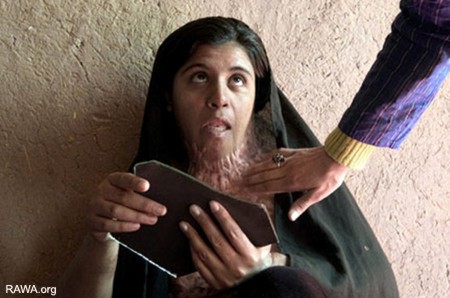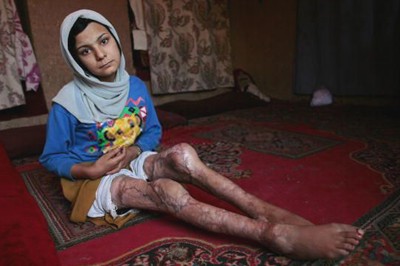This is the story of two Afghan girls.
One of these 11-year-olds was brimming with hope and chattering away in her open-air classroom about her love for mathematics and her ambitious dreams.
The other 11-year-old girl was forced to marry her father's friend, never saw the inside of a classroom, and lost her will to live before reaching adolescence.
This is the story of Najia and Sher, whose contrasting lives speak to the tragic powerlessness of many Afghan women - and to the renewed hope many are finding in a burgeoning education system.

October 22, 2004: Zarah, 19-years-old, shows scars that she suffered when she set fire to herself at the climax of an argument with her husband only three months into their marriage in Herat, Afghanistan. (Photo by Paula Bronstein)
More Photos
A morbid hospital photo of Sher serves as a solemn reminder of how childhood often ends for girls in Afghanistan.
Girls as young as 11 are considered just old enough for a husband.
Their parents collect lucrative $10,000 dowries from wealthy grooms-to-be, and these pre-teens are sent off to become housewives and start raising families.
Last year 60 Kandahar girls sought to escape their fate through suicide, provincial officials say. Like Sher, many wound up as hospital burn victims after dousing themselves with gasoline and setting themselves ablaze.
Then there are girls like Najia.
This bright-eyed child with the shiny red headscarf has very different designs for her future.
"I want to be a doctor," says the talkative girl. "I want to serve my country by helping sick people. My parents tell me: 'Go to school. In our time there was no education system. Especially under the Taliban - you couldn't go to school. So take advantage."'
Seven years after the fall of the Taliban, this expressive child who covers her mouth to stifle her frequent giggles remains a rarity in this country."
Less than one-third of Afghan children go to school and the rate is even lower in Kandahar province.
Girls comprise just 17 per cent of the province's students, and the overall literacy rate among women here looks like a statistic from another century: Only five per cent can read.
But if the Canadian government and international donors have their way, there will be far more girls like Najia.
Canada's $90-million education program in this country includes $1.5 million for classrooms like Najia's.
She will soon complete her third successive grade in just over a year, as part of a Save the Children program aimed at getting kids into classrooms and caught up in time for high school.
One glimpse into her classroom is enough to induce culture-shock in a North American visitor.
In this outdoor courtyard behind a mud-brick home, there are no glassy-eyed gazes from pupils. No bored yawns, vacant stares, or surreptitious chatter.
On the carpeted floor of this yard, children don't crowd the spots near the back of the rug; these seven-to 12-year-olds are desperate to be called to the front.
They clamour for the teacher's attention, with a burst of tiny fingers and hands springing skyward whenever he asks for a volunteer.
When they hear their names, they leap toward the blackboard and race through basic facts, multiplication tables, and word-spelling as swiftly as they sprint across the room.
Before each high-speed reply to the teacher's question, they begin by thanking God: "In the name of Allah, the most beneficent, the most merciful, five times five is 25."
Most Afghan women will never experience this.
Only 2,000 students in Kandahar are enrolled in these free, accelerated learning classes. But Canada has put forward $1.5 million to help the Save the Children organization double its number of classes by next year.
There are also programs for older women who've never gone to school.

Shahnaz,14, sits on the floor of her family home November 17, 2006 in Herat, Afghanistan. She tried to commit suicide a year ago pratically crippling herself from the severe burns after her father lost her in a gambling match. She spent a year in the Herat hospital. The medical staff at the Herat hospital says that they have registered around 700 self-immolations cases so far this year. (Photo by Paula Bronstein)
More than 12,000 adults - mostly women - are enrolled in a United Nations-led program to teach basic literacy, math, and nutrition.
To gain permission from their skeptical husbands, families are given flour and cooking oil if they let their women come to school.
One Canadian government employee says she's seen the program double in size since last year.
While many remain leery of a Western, secular education, she says those who've passed through the system have marvelled at the benefits of being able to read.
Women suddenly realized they'd been getting short-changed in their carpet-weaving or tailoring business when they learned to read forms and count customers' change.
"They were proud, they were confident," said Sandra Choufani, a Canadian diplomat who just completed a one-year Afghan tour.
"They used to have no idea what the (customers) were giving them."
There are tens of thousands of others who remain unconvinced.
The farther away you stray from downtown Kandahar city, the more likely you are to find parents who believe that boys should be earning money and girls should be thinking of marriage - not studying multiplication tables.
Choufani has a ready reply for them.
Women die every day in Afghanistan from pregnancy complications, usually because even if they experience pain they will refuse to go see a male doctor.
It's anathema to southern Afghanistan's culture for a woman to let a male stranger shake her hand or see her face uncovered - let alone examine her body.
Choufani frequently heard women in rural areas dismiss the value of an education, and then complain about the lack of female doctors.
She asked them to draw the link.
"They would say, 'No (an education) is unnecessary,"' Choufani said."Then they would say, 'We want female doctors.' ... Women couldn't make the connection that there were no female doctors because women weren't going to school."
That argument apparently won some converts to the cause of schooling.
A local women's leader offers a more traditional gender-based argument in favour of education.
Runa Tareen, the director of women's affairs for Kandahar province, also plans to marry off all three of her daughters once they complete the ninth grade.
"They will also be mothers. They can also educate their children," Tareen said in an interview.
"If they can give a good education to their children, that will make them good wives as well."
She says boys can always find a manual job without any schooling - but a woman who wants to work needs an education first.
Tareen carries around a grim hospital photo illustrating the fate of one girl who never got the chance.
Sher Banu was forced to marry her father's friend at age 11. She quickly escaped from her marital home, which resulted in a punishment of two years in prison, and she vowed never to return to live with that man.
She died in hospital soon after her release, her entire body blackened from self-inflicted burns.
Wrapped around her face was a light red headscarf, just a shade less bright than Najia's.



